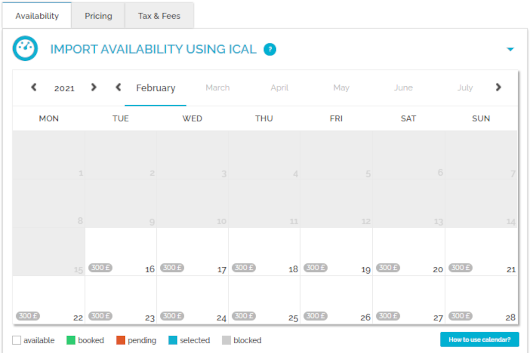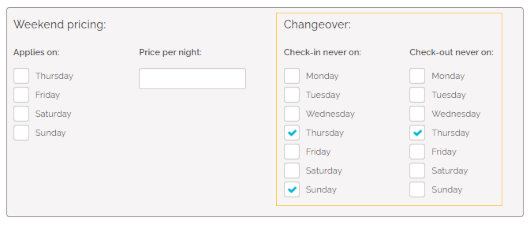Step 5: Price and availability
LOS pricing model
In LOS pricing, it is possible to specify fixed nightly pricing plans for different numbers of nights and (optionally) for different number of guests. It means that your prices can depend on the number of booked nights and guests staying at your property.
Here is how LOS pricing works. For example, let's say your Daily price is 200 USD. If you continue using the Daily price model and one guest decides to book your property for three nights - the total is 600 USD.
In case you use LOS pricing, you can easily set that one guest pays a different amount per night, depending on how many nights were booked. For example, 1 guest can pay 200 per night if a 3-night stay was booked - the total is 600 USD. But you can easily set that 1 guest can pay 190 USD per night if a 4-night stay was booked - the total is 760 USD.
You can do the same for the number of guests and set different prices for different cases.
TTS provides us with the data in the format of available stays, the <CheckInOptions>. The <CheckInOptions> lengths range from 1 to 8 days. Before you continue reading on the LOS pricing, see Daily price first.
Once we have the list of available daily price candidates, we also use it to create the LOS records. The LOS prices are created from the available daily price candidates, excluding the ones that have been used for the daily price itself.
-
If there are 1-day long <CheckInOptions> available, price for this day will be calculated once (only on 2023-12-10)
e.g. <TotalAmount> = 200 USD / 1 = 200 USD
-
If there are 2-day long <CheckInOptions> available, price for this day will be calculated twice
for 2023-12-09 to 2023-12-10
e.g. <TotalAmount> = 450 USD / 2 = 225 USD
and 2023-12-10 to 2023-12-11
e.g. <TotalAmount> = 450 USD / 2 = 225 USD
-
If there are 5-day long <CheckInOptions> available, price for this day will be calculated 5 times
for 2023-12-06 to 2023-12-11
e.g. <TotalAmount> = 700 USD / 5 = 140 USD
for 2023-12-07 to 2023-12-12
e.g. <TotalAmount> = 700 USD / 5 = 140 USD
for 2023-12-08 to 2023-12-13
e.g. <TotalAmount> = 800 USD / 5 = 160 USD
for 2023-12-09 to 2023-12-14
e.g. <TotalAmount> = 800 USD / 5 = 160 USD
for 2023-12-10 to 2023-12-15
e.g. <TotalAmount> = 800 USD / 5 = 160 USD
In this case, the created LOS prices are the following:
-
LOS1 = 200 USD
-
LOS2 = 225 USD
LOS5 is not created because this price has been used to create the daily price.
Note: In synchronisation with TTS, the maxLOS created is LOS8.
FSP pricing model (N/A)
Daily price model
Daily price

Daily price is the standard way of setting prices. It indicates the base price per night for the Standard number of guests.
TTS provides us with the data in the format of available stays, the <CheckInOptions>. The <CheckInOptions> lengths range from 1 to 8 days.
When setting the daily price of a particular day, we consider all <CheckInOptions> available for that day. It means we take the <TotalAmount> and divide it by the number of days passed in the <CheckInOptions>. The calculation is repeated for each indication of that particular day across all the <CheckInOptions>. From all the different daily price candidates, we select the daily price candidate that is most-frequently used and set it as the daily price.
For example, the daily price candidates for 2023-12-10 will be calculated from all the <CheckInOptions> that include that day.
-
If there are 1-day long <CheckInOptions> available, price for this day will be calculated once (only on 2023-12-10)
e.g. <TotalAmount> = 200 USD / 1 = 200 USD
-
If there are 2-day long <CheckInOptions> available, price for this day will be calculated twice
for 2023-12-09 to 2023-12-10
e.g. <TotalAmount> = 450 USD / 2 = 225 USD
and 2023-12-10 to 2023-12-11
e.g. <TotalAmount> = 450 USD / 2 = 225 USD
-
If there are 5-day long <CheckInOptions> available, price for this day will be calculated 5 times
for 2023-12-06 to 2023-12-11
e.g. <TotalAmount> = 700 USD / 5 = 140 USD
for 2023-12-07 to 2023-12-12
e.g. <TotalAmount> = 700 USD / 5 = 140 USD
for 2023-12-08 to 2023-12-13
e.g. <TotalAmount> = 800 USD / 5 = 160 USD
for 2023-12-09 to 2023-12-14
e.g. <TotalAmount> = 800 USD / 5 = 160 USD
for 2023-12-10 to 2023-12-15
e.g. <TotalAmount> = 800 USD / 5 = 160 USD
In this example, across all the <CheckInOptions> the most frequently appearing daily price candidate for the 2023-12-10 is 160 USD / per night.
|
|
Standard number of guests

Standard number of guests refers to the maximum number of guests included in the Daily price for whom the price does not change. If more guests than specified book a stay, the extra guests will be charged with the price set in the Extra guest price element.
|
Extra guest price (N/A)
Minimum stay
Minimum stay indicates the minimum number of days a reservation can be made for. Guests will be not be able to book your property if they want to book stays shorter than minim stay. This value is mandatory to provide.
The minimum stay value is set up on the basis of the <CheckInOptions> length. The shortest available <CheckInOptions> is set as the minimum stay value. For example, if the shortest available <CheckInOptions> is 8-day-long, then the minimum stay value is 8.
|
Weekend pricing (N/A)
Occupancy pricing (N/A)
Complimentary topics
Discounts N/A
Calendar
Calendar stands for the property's availability to rent. You can check here the availability of your property in the selected time frames. Once a reservation is inserted in Rentals United, the availability in the calendar gets blocked for this period. The calendar is updated automatically every time the availability of the property changes or at predefined times to remain up-to-date.
Availability of a property is set on the basis of the received <CheckInOptions>. <CheckInOptions> indicate possible stays, therefore all received <CheckInOptions> will open the calendar for the indicated periods. For example, if the received <CheckInOptions> is for the period from 2023-11-28 to 2023-12-06, it means this period is opened in Rentals United
|
Preparation Time Before Arrival (N/A)
Changeover restrictions
Changeover restrictions specify whether check-in or check-out is allowed for a given day. This is a great option if you need the guests checking in and out to fit your schedule and it will help you avoid unexpected guests. If some days are restricted from changeovers, then your guests will simply not be able to select such a stay if the start or end day falls on a changeover-restricted day.
Changeovers are set on the basis of the received <CheckInOptions>. <CheckInOptions> indicate possible stays, therefore all dates indicated by the <CheckInOptions> will be marked according to the availability.
Check-in possible - when the season starts
Check-out possible - when the season ends
Both check-in and check-out possible - when one season ends and another season starts
None - all remaining days
|
Tax (N/A)
Fee (N/A)
Down payment (N/A)
Security deposit (N/A)
Currency
Currency in Rentals United is a fixed value, by default established on the basis of the property location. The currency of any property can be checked in Rentals United, go to Step 5: Price and availability after selecting All properties tab.
Therefore, if the property's currency does not match the one of the city the property is located in, the currency defined in PMS will not be synchronized. In such a case, the currency from PMS will be converted to the currency of the city.



